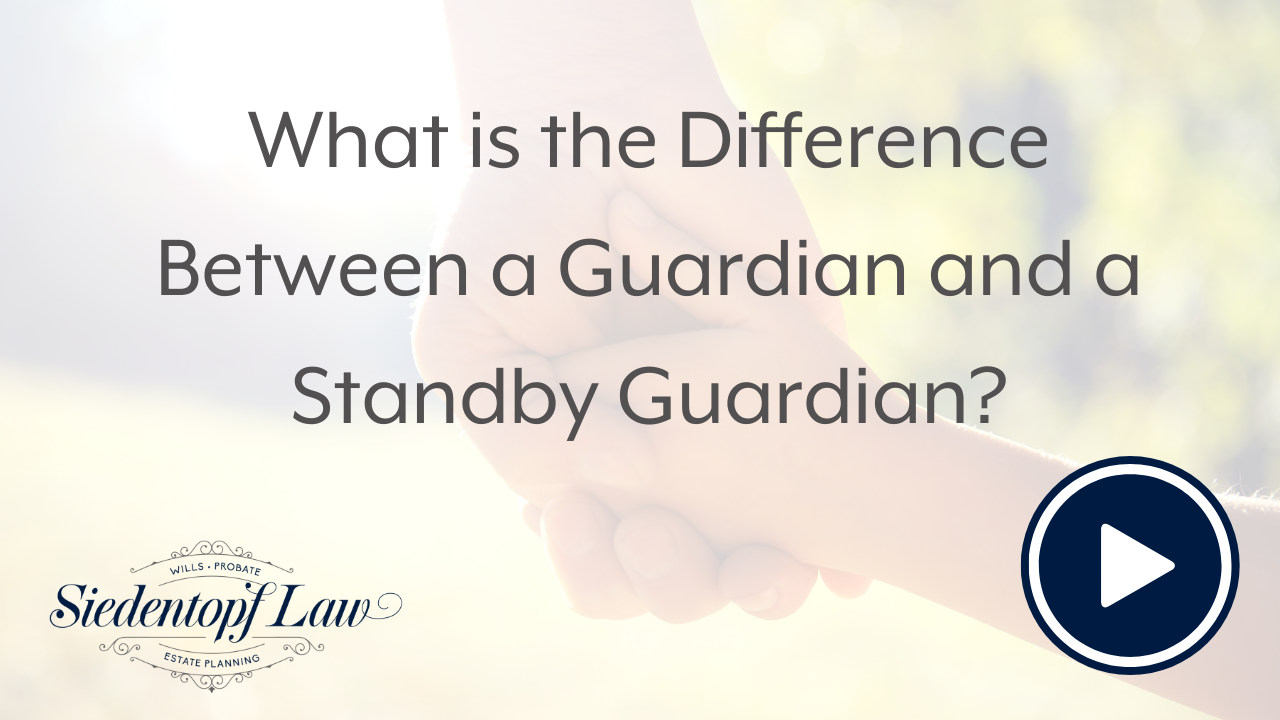What is the difference between a guardian and standby guardian?
Thanks for watching our video about the differences between a Guardian and a Standby Guardian. These two roles are similar yet different and are very important components of your estate plan if you have minor children.
So, let’s dig into them a little more.
Standby Guardian
As we learned in the video a Standby Guardian designation is only active during your lifetime. It is a short-term designation that only kicks in when you are alive but unable to care for your children.
You may be wondering under what circumstances would you need a Standby Guardian in place? Well, some instances could include if you are being hospitalized or undergoing medical care that could incapacitate you for a short amount of time. Another instance would be if you are traveling without your children and leaving them with a friend or neighbor— or even if they are older and home alone. Having a Standby Guardian in place for these instances will prevent family and child services from getting involved if no one can reach you.
So, what can a Standby Guardian do? As mentioned before, this is a short-term designation only effective while you are living. This person can authorize medical care, talk to the school, pick your children up from daycare or the school, and other things they wouldn’t be able to do without a court order. The Standby Guardian gives another adult authority to do the things that you do as a parent without involving child services.
While it’s not a legal requirement, it is absolutely crucial that this person lives close by. Designate someone who can get there quickly in case of an emergency. A great rule of thumb is that if the babysitter calls them at 3am because you’re not home or answering your phone, your standby guardian can be there in 1 hour or less. This does not mean this person is the best choice for long-term care, this is just the emergency contact you trust to care for your children for a short time in case of an emergency.
Guardian
The Guardian named in your Will is the person you have selected to provide long-term care for your children after your death.
This person, or people, will care for your child until the age of 18– and probably well beyond that. It is important that you select a person, or people, you trust to provide the financial and emotional support your child needs as they grow up without you– their parent.
You may choose someone who lives close to prevent any more upheaval than necessary, but this is not as crucial as choosing the person you feel is best to care for and raise your children. Your guardian may live in another state or country and should be your best choice for long term care.
A Guardian, unlike a standby guardian, can only be named in a Will. This is perhaps the most important reason to have a Will—so that you can name the person, or people, you feel are most equipped and capable of raising your children should you pass away before they are grown.
Which do I need?
You may be wondering which guardianship designation you need right now. The truth is that if you have minor children, you need both. Even if you are designating the same person to be both the standby guardian and the guardian named in the Will. If you don’t have a standby guardian in place and you need one, family services and the Court will likely have to get involved to grant that person the authority to make those decisions on behalf of your child.
If you are concerned about this person overstepping their authority, talk to your attorney to see what kinds of safeguards can be put into place to prevent this.
For more information about estate planning and how to create a plan to care for your children in your absence, download our guide Planning to Protect Your Children.
If you have minor children and haven’t put guardianship designations into your estate plan, let’s talk! I’d love to help you safeguard your most precious assets— your children. Call us at (404) 736-6066 or visit our website to schedule a consultation.








